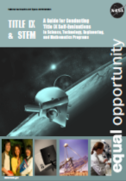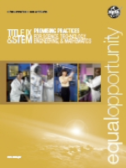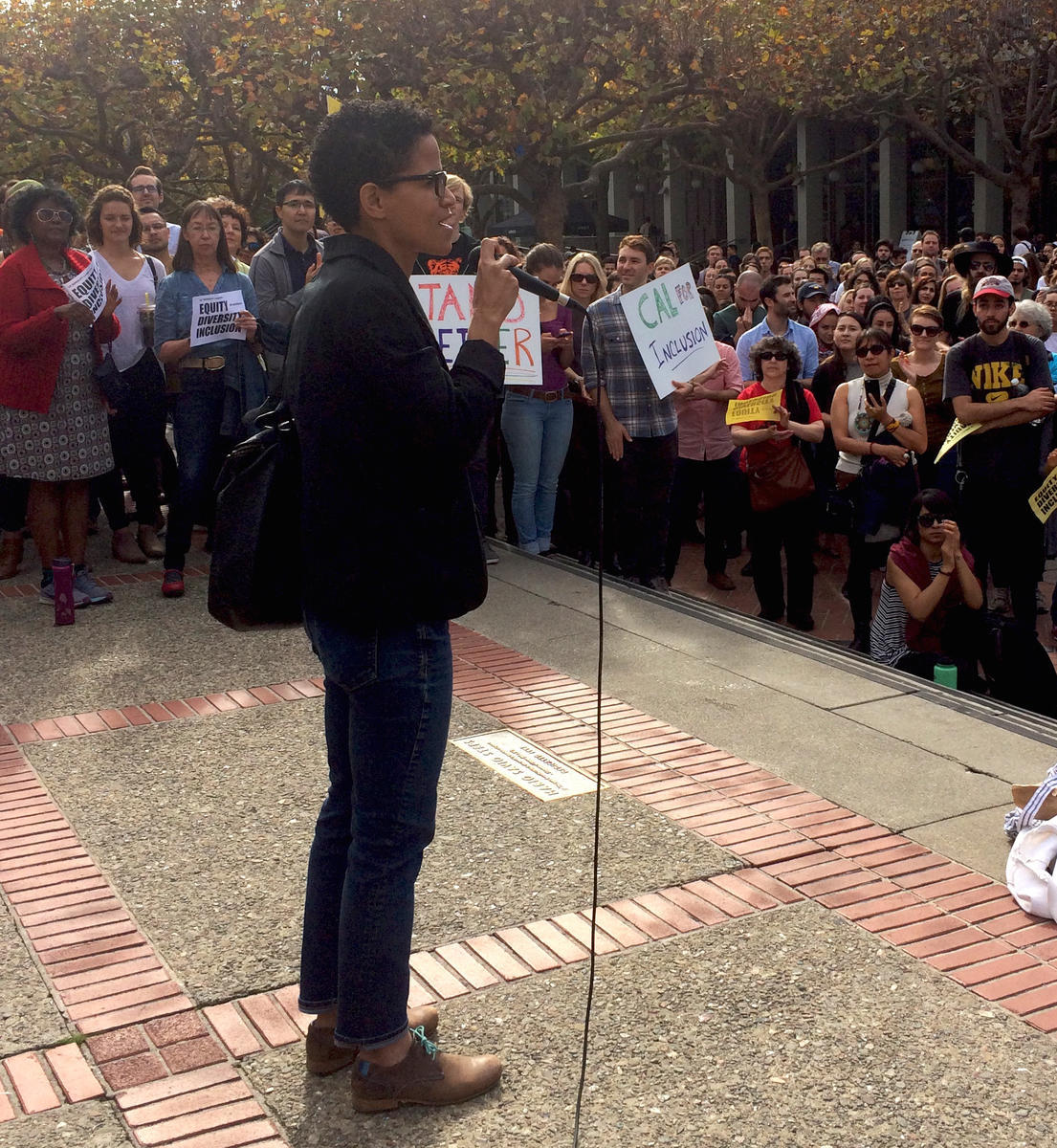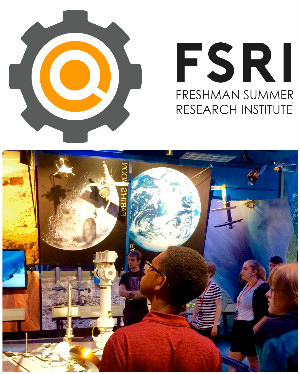 |
Title IX of the Education Amendments Act of 1972
(Gender in Educational Programs)
» Background
 Title IX of the Education Amendments of 1972  is a Federal civil rights law prohibiting discrimination on the basis of sex in educational programs and activities receiving Federal financial assistance. The law promotes equality of opportunity, regardless of gender, and represents a national commitment to enhance educational and employment opportunities. is a Federal civil rights law prohibiting discrimination on the basis of sex in educational programs and activities receiving Federal financial assistance. The law promotes equality of opportunity, regardless of gender, and represents a national commitment to enhance educational and employment opportunities.
Many know of Title IX as a tool that has been used very effectively to encourage equal opportunity regardless of gender in athletics. However, Title IX also applies in the academic context. Under Title IX, educational programs receiving Federal financial assistance are prohibited from discriminating on the basis of sex and must ensure equal educational opportunities for all program beneficiaries. One important area where concerns relating to gender equity still exist is in the fields of science, technology, engineering, and mathematics (STEM).
▸ Read more...
As a Federal Agency awarding funding to educational programs, NASA developed Title IX regulations  to ensure that educational programs the Agency funds afford equal opportunities to their beneficiaries, i.e., students, regardless of gender, and are free of gender discrimination and/or harassment. Part of NASA’s charge under its Title IX regulations, and more recently the Agency’s 2005 Authorization Act, is to conduct compliance reviews of grant recipient programs to better ensure that the programs provide equal opportunities regardless of gender, as required by Title IX. In addition, in recent years, the issue of gender has become the focal point of a great deal of attention in the STEM fields, where the numbers of women remain low (particularly in such fields as physics, aerospace and electrical engineering, and computer science). to ensure that educational programs the Agency funds afford equal opportunities to their beneficiaries, i.e., students, regardless of gender, and are free of gender discrimination and/or harassment. Part of NASA’s charge under its Title IX regulations, and more recently the Agency’s 2005 Authorization Act, is to conduct compliance reviews of grant recipient programs to better ensure that the programs provide equal opportunities regardless of gender, as required by Title IX. In addition, in recent years, the issue of gender has become the focal point of a great deal of attention in the STEM fields, where the numbers of women remain low (particularly in such fields as physics, aerospace and electrical engineering, and computer science).
In July 2004, the Government Accountability Office (GAO) issued a report, "Gender Issues: Women’s Participation in Sciences has Increased, but Agencies Need to Do More to Ensure Compliance with Title IX.  " The report recommended that the Administrator of NASA take actions to ensure that compliance reviews of NASA recipients are conducted as required by the Title IX regulations. This recommendation was codified in NASA’s 2005 Authorization Act, requiring the Agency to conduct at least two Title IX compliance reviews annually. " The report recommended that the Administrator of NASA take actions to ensure that compliance reviews of NASA recipients are conducted as required by the Title IX regulations. This recommendation was codified in NASA’s 2005 Authorization Act, requiring the Agency to conduct at least two Title IX compliance reviews annually.
Since 2006, NASA has conducted two onsite Title IX compliance reviews per year. During its reviews, NASA has looked at institutional requirements such as Title IX coordination, policy dissemination, and implementation of internal discrimination complaints procedures. NASA also has reviewed Title IX compliance in STEM programs in a host of areas relating to program administration and the program environment, including recruitment, admissions, education and awareness, and physical safety of the program environment, to name a few.
» Compliance Requirements
» Promising Practices
Compliance Requirements
Designation of Responsible Official for Title IX Coordination and Enforcement
The NASA Title IX regulations state that a recipient must designate an official responsible for Title IX coordination and enforcement, i.e., a "Title IX Coordinator." The recipient must notify all students and employees of the Title IX Coordinator’s name, office address, and telephone number. While the NASA Title IX regulations do not provide further specificity regarding the role and effective functioning of the Title IX Coordinator’s role, the U.S. Department of Justice (DOJ), which has oversight responsibility for all Federal Title IX compliance and enforcement activities, has provided additional considerations for Federal agencies evaluating recipient compliance with the Title IX Coordinator regulatory provision.
▸ Read more...
These additional considerations appear in DOJ’s guidance document, "Questions and Answers Regarding Title IX Procedural Requirements  " (Title IX Q&A) and include: " (Title IX Q&A) and include:
- Effective functioning, including skills and competencies, regarding the administration and implementation of the university's Title IX grievance process;
- The authority and access of the Title IX Coordinator to university senior leadership needed to effectively perform roles and responsibilities; and
- Appropriate training of faculty, staff, and students.
Adoption of Title IX Grievance Procedures and Title IX Policy Dissemination

NASA Title IX regulations require that recipient educational institutions adopt and publish grievance procedures providing for prompt and equitable resolution of student and employee complaints alleging any action that would be prohibited by Title IX. The regulations do not specify a structure or format for the grievance procedures.
NASA’s Title IX regulations also require grant recipients to take specific and continuing steps to notify students, employees, applicants for admission and employment, and unions or professional organizations having collective bargaining or professional agreements with the recipient, that it does not discriminate based on gender in the educational programs or activities that it operates, and that it is required by Title IX not to discriminate in such a manner.
▸ Read more...
NASA’s compliance assessments seek to ensure that grant recipients have developed and are implementing procedures that afford a grievant "prompt and equitable" resolution of student and employee complaints alleging any action that would be prohibited by the Title IX regulations. As the regulations do not provide any further specificity regarding the procedures, NASA looks to the Department of Justice Title IX Q&A Department of Educations (ED) and Office of Civil Rights (OCR)’s Revised Sexual Harassment Guidance  , which provide additional considerations on the basic components of effective, i.e., prompt and equitable, grievance procedures in the discrimination and harassment context. In its Revised Sexual Harassment Guidance OCR identified a number of elements in evaluating whether a school's grievance procedures are prompt and equitable, including whether the procedures provide for: , which provide additional considerations on the basic components of effective, i.e., prompt and equitable, grievance procedures in the discrimination and harassment context. In its Revised Sexual Harassment Guidance OCR identified a number of elements in evaluating whether a school's grievance procedures are prompt and equitable, including whether the procedures provide for:
- Notice to students, parents of elementary and secondary students, and employees of the procedure, including where complaints may be filed;
- Application of the procedure to complaints alleging harassment carried out by employees, other students, or third parties;
- Adequate, reliable, and impartial investigation of complaints, including the opportunity to present witnesses and other evidence;
- Designated and reasonably prompt timeframes for the major stages of the complaint process;
- Notice to the parties of the outcome of the complaint; and
- An assurance that the school will take steps to prevent recurrence of any harassment and to correct its discriminatory effects on the complainant and others, if appropriate.
Importantly OCR states that "[a] grievance procedure . . . cannot be prompt or equitable unless students know it exists, how it works, and how to file a complaint. Thus, the procedures should be written in language appropriate to the age of the school's students, easily understood, and widely disseminated." OCR further states that "[m]any schools also provide an opportunity to appeal the findings or remedy, or both."
OCR does not specifically include appeal rights among the elements it recommends in evaluating whether a recipient’s procedures are prompt and equitable. However, in its April 2011 Dear Colleague letter  providing guidance to federal grant recipients on their internal grievance processes under Title IX, OCR states that a "preponderance of the evidence," is the appropriate standard in cases of sexual harassment. providing guidance to federal grant recipients on their internal grievance processes under Title IX, OCR states that a "preponderance of the evidence," is the appropriate standard in cases of sexual harassment.
Relevant ED OCR and DOJ guidance also inform NASA’s assessment of compliance with the regulatory provision requiring dissemination of Title IX policy. This guidance clarifies the regulatory requirement. For example, OCR’s guidance emphasizes the need for recipient institutions to have "well-publicized" grievance procedures.
In addition, OCR states, "without a disseminated [sexual harassment] policy and procedure, a student does not know either of the school’s policy against and obligation to address this form of discrimination, or how to report harassment so that it can be remedied." Importantly, OCR states:
Distributing the procedures to administrators, or including them in the school's administrative or policy manual, may not by itself be an effective way of providing notice, as these publications are usually not widely circulated to and understood by all members of the school community. Many schools ensure adequate notice to students by having copies of the procedures available at various locations throughout the school or campus; publishing the procedures as a separate document; including a summary of the procedures in major publications issued by the school, such as handbooks and catalogs for students, parents of elementary and secondary students, faculty, and staff; and identifying individuals who can explain how the procedures work.
DOJ regulations also make Federal funding agencies and recipient institutions responsible for disseminating information materials, e.g., handbooks, manuals, pamphlets, to ensure program beneficiaries are aware of their rights pursuant to EO law.
Title IX Self-Evaluation

NASA Title IX regulations required recipient institutions to conduct a Title IX Self-Evaluation regarding admissions and treatment of students by September 29, 2001, and to keep the Self-Evaluation on file for three years.
While grant recipients are not obligated to conduct a further Title IX Self-Evaluation, such evaluations are very helpful to ensure, for example, that selection criteria and academic practices do not adversely impact students. They also provide an opportunity to evaluate trends over time and to develop mechanisms for proactively addressing emerging issues. NASA has developed a Guide for Conducting Title IX Self Evaluations accessible on the Mission STEM Web site, as well as a data analysis tool to use with the Guide.
Recruitment and Outreach, Admissions, Enrollment, Assistantships, and Degrees Earned
NASA Title IX regulations state that recipients may not discriminate on the basis of sex in admissions and recruitment. Consistent with this requirement, NASA reviews its grant recipient policies and procedures regarding student recruitment, and admissions practices, as well as student departures and degrees earned. For graduate students, NASA also examines financial assistance awarded to students and success on the STEM program's major advancing exams (e.g., the comprehensive and qualifying exams). The reviews are normally based on at least five academic years of data, and in some areas, seven years of data are examined.
Program Administration and Academic Environment

The NASA Title IX regulations provide that a recipient shall not, on the basis of sex, exclude from participation in, deny the benefits of, or otherwise limit any person in any advantage or opportunity pertaining to academic, extracurricular, research, occupational training, or other education program or activity operated by the recipient. The Title IX regulations explicitly state that a recipient may not discriminate on the basis of gender with regard to career counseling or guidance.
The NASA Title IX regulations include a detailed provision on matters pertaining to marital and parental status. Generally, under the regulations, a recipient may not apply any rule concerning a student's actual or potential parental, family, or marital status that treats students differently on the basis of sex. Regarding pregnancy and related conditions, the regulations state that a recipient may not discriminate against any student, on the basis of the student's pregnancy, childbirth, false pregnancy, termination of pregnancy, or recovery, unless the student requests voluntarily to participate in a separate portion of the program or activity of the recipient.
▸ Read more...
The regulations require that pregnancy and childbirth be treated in the same manner and under the same policies as any other temporary disability or physical condition. Further, Title IX requires that in the case of a recipient that does not maintain a leave policy for its students, or in the case of a student who does not otherwise qualify for leave under such a policy, "a recipient shall treat pregnancy, childbirth, false pregnancy, termination of pregnancy, and recovery from the termination of pregnancy as a justification for a leave of absence for as long a period of time as is deemed medically necessary by the student's physician, at the conclusion of which the student shall be reinstated to the status that she held when the leave began."
In addition, the Title IX regulations incorporate, by reference, the NASA Title VI regulatory provision prohibiting a recipient from utilizing methods of administration which have the effect of defeating or substantially impairing accomplishment of the objectives of the program for an individual based on sex.
Promising Practices

Since the inception of its Title IX compliance program, NASA has followed a philosophy of providing meaningful technical assistance to the institutions and programs it has reviewed under Title IX. In keeping with this philosophy, NASA balances its Title IX compliance assessments with efforts to identify and report on promising practices of the educational institutions the Agency reviews, in part so that we may share these practices with other institutions and stakeholders. In 2009, NASA compiled the promising practices observed during its onsite compliance reviews in a publication titled Promising Practices for STEM.
Evaluation of Climate
NASA notes the University of California, Berkeley Astronomy Department’s Climate Advisory group, which includes students, staff, faculty, and researchers. The mission of the group is to be educated on issues of sexual harassment and discrimination, to promote campus resources, and to help devise and implement solutions to climate problems. The Climate Advisory group has met twice since 2015. The Astronomy Department has also formed a new team of Astronomy representatives to maintain open lines of communication between faculty, postdocs, graduate students, undergraduates, and staff. This group meets approximately every three weeks to discuss issues and possible solutions. These initiatives, although young, are concrete evidence of efforts to bolster diverse voices in order to promote a healthier Department environment.
Faculty Equity Advisors
 Every department at University of California, Berkeley has a Faculty Equity Advisor whose role is to help “ensure that diversity and equity are considered in all aspects of the academic mission.” Faculty Equity Advisors work provide support for faculty searches, consult with graduate admissions committees, and promote a positive department climate. (University of California Berkeley, Campus Climate, Community Engagement & Transformation, “Faculty Equity Advisors,” accessed at https://campusclimate.berkeley.edu/faculty/our-programs-and-services/faculty-equity-advisors.) Every department at University of California, Berkeley has a Faculty Equity Advisor whose role is to help “ensure that diversity and equity are considered in all aspects of the academic mission.” Faculty Equity Advisors work provide support for faculty searches, consult with graduate admissions committees, and promote a positive department climate. (University of California Berkeley, Campus Climate, Community Engagement & Transformation, “Faculty Equity Advisors,” accessed at https://campusclimate.berkeley.edu/faculty/our-programs-and-services/faculty-equity-advisors.)
"Respect is Part of Research" Workshops
“Respect is Part of Research” Workshops at University of California, Berkeley and California Institute of Technology. NASA applauds the inclusion of this workshop as part of the graduate student orientation. In addition to providing training on discrimination and sexual harassment, it is important to educate students on climate issues in a scientific setting.
Freshman Summer Research Institute (FSRI)
 FSRI is an orientation and academic support program at California Institute of Technology designed to ease the transition from high school to college while building a strong research foundation, for incoming underrepresented and/or underserved first-year students to Caltech's research and math curriculum, culture, academic and student support services. It includes a 5-week summer research assignment with a Caltech faculty member, postdoctoral scholar, or graduate student; a 4-week opportunity to prepare for Caltech's first year math course; room and board on Caltech’s campus; group field trips, excursions, and social activities; opportunities to learn and engage in first-year student programing and Caltech culture; and travel assistance available for those who qualify: https://diversitycenter.caltech.edu/programs/fsri. FSRI is an orientation and academic support program at California Institute of Technology designed to ease the transition from high school to college while building a strong research foundation, for incoming underrepresented and/or underserved first-year students to Caltech's research and math curriculum, culture, academic and student support services. It includes a 5-week summer research assignment with a Caltech faculty member, postdoctoral scholar, or graduate student; a 4-week opportunity to prepare for Caltech's first year math course; room and board on Caltech’s campus; group field trips, excursions, and social activities; opportunities to learn and engage in first-year student programing and Caltech culture; and travel assistance available for those who qualify: https://diversitycenter.caltech.edu/programs/fsri.
WAVE Fellows Program
WAVE Fellows Program, a program at California Institute of Technology designed to increase participation of underrepresented students in science and engineering PhD programs. WAVE Fellows receive $600 weekly over the summer, as well as a housing allowance. Students have research opportunities, weekly seminars by faculty and JPL scientists and engineers, an academic and professional development series, social and cultural activities, field trips, and weekly small student/faculty dinners: http://sfp.caltech.edu/programs/wavefellows.
Bonding Leave
Students at California Institute of Technology may take six weeks of family bonding leave without pay, by submitting a personal leave petition to the Graduate Office for approval. Students returning from approved bonding leave shall return to his/her program in good academic standing.
Designation of Responsible Official for Title IX Coordination and Enforcement
Title IX Compliance Committee.
The Georgia Institute of Technology (Georgia Tech) is an example of an institution that has established a Title IX Compliance Committee with members appointed by the President. The Committee, which has been operational since 2006, is designed to provide institutional support to the Title IX Coordinator. Its charter states that the Committee is responsible for "raising campus awareness, assessing current policies and practices and the effects of such with regard to admissions, treatment of students, and the employment of personnel on campus." The committee meets at least once a semester and reports out to the President annually.
Strong Title IX Coordinator Role in Education and Awareness Activities
The University of California, Los Angeles (UCLA) Title IX Coordinator plays an important role in the development and implementation of training resources for students, in both the orientation and academic course settings. The trainings developed by the Title IX Coordinator’s office are imaginative and innovative, as well as substantive and detailed.
For example, the training module "Avoiding Sexual Discrimination in the Classroom" includes specific examples of bias in the classroom setting, e.g., habitually recognizing and calling on men more often than women in class discussions, interrupting female students more often than males, or allowing others in the class to do so. Also, the breadth and depth of the training across the campus community, from Teaching Assistantship (TA) orientation to Women Studies Program courses, is exemplary.
Strong Collaboration Between the Offices with Lead Title IX Responsibilities

The University of Colorado Boulder (UCB), like many universities, has more than one office with key Title IX roles and responsibilities. Often, universities bifurcate Title IX case loads based on who the allegation is being brought against, that is, faculty and staff member or student. At UCB, two offices, the Office of Discrimination and Harassment (ODH) and the Office of Student Conduct (OSC), have lead Title IX responsibilities, with ODH responding to cases in which a faculty member is the alleged offender and OSC in cases in which it is a student.
It is logical that the two offices would have a strong collaborative relationship, which is indeed the case at UCB. What is most promising about the collaboration between these offices, however, is the great extent to which they have gone to ensure appropriate coordination on all aspects of their shared roles and responsibilities, from information dissemination to the monitoring and trends analysis of the complaints process.
In addition, the two offices have engaged in innovative and targeted efforts regarding information dissemination. For example, they partnered in 2009 to purchase an advertisement regarding their respective services on ten "Buff Buses," which transport student-athletes to events off-campus and sometimes students at large around campus.
Targeted, Innovative Education and Awareness Efforts
The UCB OSC makes presentations to fraternities, male athletic programs, the ROTC, residence halls, and other targeted campus organizations, using male-to-male presentations to enhance the impact for student participants. The presentations address the consequences of improper behavior and make a lasting impression. These sessions have been described as highly interactive, robust in the exchanges and sometimes provocative because of the challenge of the instructor to participants to think about treatment of women from the perspective of interacting respectfully with someone’s sister or mother. The result is that the participants know the rules, expectations and consequences. Feedback from those who have witnessed the presentations is that they are stark and direct enough to have a meaningful connection with the male participants.
Adoption of Title IX Grievance Procedures and Title IX Policy Dissemination
Title IX Policy Dissemination to Principal Investigators
Georgia Tech makes it a policy to provide all its Principal Investigators receiving federal grant funding with the following language accompanying each notice of award: "Title IX of the Education Amendments of 1972 prohibits discrimination on the basis of sex (gender) in any operations or programs of a university receiving federal funds. Georgia Tech by policy expressly prohibits any acts of non-compliance with Title IX."
Other Title IX Information Dissemination
Georgia Tech enhances its Title IX information dissemination by posting an electronic version of the NASA brochure, “Nondiscrimination and Equal Opportunity in NASA Assisted Programs: Title VI of the Civil Rights Act of 1964 and Related Laws,” (which includes information on Title IX) on its Diversity@Tech web site.
Procedures for Responding to Reports of Sexual Harassment
UCLA has taken an important and proactive step by having a separate set of procedures specifically for reports of sexual harassment. Such procedures elevate the importance of reporting allegations of sexual harassment and serve to put the University community on notice that sexual harassment will not be tolerated. They also serve to emphasize the University’s commitment to promptly and effectively addressing sexual harassment, where it is found to have occurred.
Demonstrated Leadership Commitment
UCB officials stated that, after the resolution of a sexual harassment lawsuit, it initiated aggressive programs to better ensure the ability of individuals, both students and faculty, to bring matters to the attention of the institution. The University recognized a need to provide additional resources to address discrimination and sexual harassment by supporting the creation of a sexual harassment investigator and sexual harassment educator within the Office of Student Conduct (OSC). UCB believes these positions are critical to the overall success of OSC and the University in responding to matters of discrimination and sexual harassment.
▸ Read more...
Additional steps included the hiring of an expert Title IX consultant to address issues relating to sexual harassment, and other proactive measures designed in part to increase knowledge about the legal requirements under Title IX and the process for filing a complaint of discrimination or harassment. To this end, UCB officials reported that information on these topics was disseminated throughout the University community. Moreover, UCB’s programs for educating students are aggressive and proactive.
The Student Code of Conduct includes sexual harassment policies and anti-discrimination policies; it is very clear and well disseminated, including presentations to fraternity houses, ROTC and all varsity sports teams. This helps to better ensure students understand the unacceptable behaviors and related consequences. The aggressive approach is found in addressing the behaviors at the faculty level as well, with a UCB requirement for all teaching faculty and teaching assistants to take anti-harassment training.
Online Dissemination of Policy and Procedures
UCB has made finding the two lead offices with responsibilities for addressing matters of discrimination and harassment intuitive through the University’s homepage search engine. While this may like common sense, NASA has found that many institutions have not taken appropriate steps to make discrimination and harassment policies and processes readily available to their academic community. It is also noteworthy that UCB has established links between ODH and OSC on their respective homepages, since both offices play leading roles, and it may not be initially clear to a student or faculty searcher wishing to raise a concern which office is the more appropriate for the particular matter.
Title IX Self-Evaluation
Collaboration on Data Gathering and Analysis
The collaboration between the Georgia Tech Office of the Dean of Engineering, the Office of Assessment, and the Title IX Coordinator, is an excellent example of cohesive efforts to accomplish an important Title IX related objective. By working together, these three different areas within the University bureaucracy are able to gather appropriate data and conduct meaningful analysis on issues of gender and STEM.
Recruitment and Outreach, Admissions, Enrollment, Assistantships, and Degrees Earned
Organized and Active Women in Engineering Program

Georgia Tech's College of Engineering (COE) has a vibrant Women in Engineering (WIE) Program that receives active support from leadership and faculty. The WIE Program also partners effectively with private sector firms such as IBM and local engineering firms. Among the many activities and initiatives currently being undertaken by the WIE Program in collaboration with its internal and external partners are: an annual two-day conference for prospective female students, providing an opportunity to interact with a panel of professional engineers; and the "Introduce a Girl to Engineering" program, held every February, in which WIE in collaboration with IBM and several local engineering firms hosts female middle school students from the state of Georgia for a Saturday program/luncheon that provides students with hands-on experience and interaction with female professionals including Georgia Tech alumna and engineering students.
In addition, Georgia Tech's College of Engineering faculty have been instrumental in working with students on issues related to gender and STEM. This has included the organization of social events imbued with a strong focus on career and professional development. For example, these events have included panel discussions with graduate students describing their efforts and experiences to undergraduates, and discussions designed to provide critical information on everything from applying for fellowships and jobs to grant proposal writing.
Web Site Enhancements

University of Alabama, Huntsville (UAH) COE significantly enhanced its Web sites to provide customized and specific information on where specifically visitors to its webpages are focusing their attention. The Dean of Engineering stated that these enhancements should greatly assist the Engineering program to better understand the interests of students that are interested in pursuing engineering degrees.
Program Administration and Academic Environment
Incorporation of Societal Impacts of Engineering into the Undergraduate Curriculum
Georgia Tech's aerospace engineering (AE) undergraduate program does an excellent job of showing the societal impacts of engineering work. For example, the introductory AE course includes material on economic and environmental impacts, such as emissions, noise pollution, and harmful chemicals from spacecraft solid rocket boosters. These efforts are also well-illustrated by a student’s description of an assignment in an undergraduate class that asked the student to develop the history of a particular engineering concept and the impact that it has had on society, showing the real-world application and the overall societal impact.
Campus Organizations and Advocacy Groups
Georgia Tech has a Women’s Resource Center on campus (part of the Office of Dean of Students), established in 1998. The Center works to enhance the academic performance and personal and professional development of women at GA Tech by creating an inclusive and supportive campus environment for women. The Center offers student-led programming on women’s issues, including Women’s Awareness Month and the Women’s Leadership Conference.
The Center also provides information and referrals on campus and to community resources. Trained advocates assist students in crisis, particularly sexual assault, sexual harassment, stalking, dating/domestic violence situations, hospitalization, and academic/non-academic issues. These services are offered after-hours as well. The Center currently has two staff members dedicated to working with students who have been stalked, sexually abused, or have been victims of dating/domestic violence.
Service-Oriented Student Engineering Work
The UAH Dean of Engineering, in his previous capacity as a professor in Industrial and Systems Engineering, organized a number of service-oriented student engineering projects. For example, he organized a group of about a dozen industrial engineering students to upgrade the storage facilities of a local non-profit’s organization building.
As Dean, he continues to work with faculty and students to identify service-oriented projects as a critical component of the curriculum, providing students the opportunity to use their engineering skills and capabilities in the community.
Exposure to Role-Models
The UAH Mechanical and Aerospace Engineering graduate program runs a weekly seminar featuring speakers and forum-type discussions. The speakers are professional aerospace engineers, both men and women.
Family Friendly Policies
Among other benefits, UCLA provides its graduate students with a ten percent discount and priority placement for their children at the University Preschool Learning Center. UCLA has a formal policy in place extending the tenure clock for faculty for pregnancy/childbirth. This practice is critical to making the University’s STEM programs more accessible to a more gender diverse faculty.
Focused Efforts to Address Campus Sexual Assault-Sexual Harassment
The comprehensive work of the UCB Sexual Assault-Sexual Harassment (SASH) Committee resulted in the publication of a Gender Violation Prevention Plan. This study and plan are groundbreaking in that they are a treatise on the underlying causes, behaviors and conditions that give rise to harassment and set forth a holistic approach to eradicating it in the university setting.
Innovative Efforts to Increase Female Faculty
The UCB Department of Astrophysical and Planetary Sciences has been creative in the past in finding ways to increase the number of female faculty, e.g., successfully making the case for special hiring funding and creating a 50-50 position to accommodate a married couple.
Demonstrated Commitment to STEM Education in K-12 Programs
Through a multi-disciplinary collaboration of the UCB School of Education, the College of Arts and Sciences, and the College of Engineering and Applied Science, the university has doubled the number of STEM majors completing secondary math and science teacher certifications compared to just five years ago. The number of physics and chemistry majors enrolling in teacher certification has more than tripled in the past three years.
One component of the effort, the Learning Assistant Program  has become a national model for preparing K-12 math and science teachers and how to improve introductory STEM courses. Since the program began in 2003, more than 440 students have participated as Learning Assistants, helping improve introductory courses in ten departments. UCB professors also have a history of conducting leading research in STEM education. Distinguished Professor and Nobel laureate Carl Wieman launched the Science Education Initiative in 2006 to incorporate research findings on effective science instruction in classrooms at CU. In 2002 he also created the Physics Education Technology Project, or PhET, incorporating a globally renowned education tool that uses interactive Web-based simulations to enhance physics instruction. has become a national model for preparing K-12 math and science teachers and how to improve introductory STEM courses. Since the program began in 2003, more than 440 students have participated as Learning Assistants, helping improve introductory courses in ten departments. UCB professors also have a history of conducting leading research in STEM education. Distinguished Professor and Nobel laureate Carl Wieman launched the Science Education Initiative in 2006 to incorporate research findings on effective science instruction in classrooms at CU. In 2002 he also created the Physics Education Technology Project, or PhET, incorporating a globally renowned education tool that uses interactive Web-based simulations to enhance physics instruction. |
 |







 Every department at University of California, Berkeley has a Faculty Equity Advisor whose role is to help “ensure that diversity and equity are considered in all aspects of the academic mission.” Faculty Equity Advisors work provide support for faculty searches, consult with graduate admissions committees, and promote a positive department climate. (University of California Berkeley, Campus Climate, Community Engagement & Transformation, “Faculty Equity Advisors,” accessed at
Every department at University of California, Berkeley has a Faculty Equity Advisor whose role is to help “ensure that diversity and equity are considered in all aspects of the academic mission.” Faculty Equity Advisors work provide support for faculty searches, consult with graduate admissions committees, and promote a positive department climate. (University of California Berkeley, Campus Climate, Community Engagement & Transformation, “Faculty Equity Advisors,” accessed at  FSRI is an orientation and academic support program at California Institute of Technology designed to ease the transition from high school to college while building a strong research foundation, for incoming underrepresented and/or underserved first-year students to Caltech's research and math curriculum, culture, academic and student support services. It includes a 5-week summer research assignment with a Caltech faculty member, postdoctoral scholar, or graduate student; a 4-week opportunity to prepare for Caltech's first year math course; room and board on Caltech’s campus; group field trips, excursions, and social activities; opportunities to learn and engage in first-year student programing and Caltech culture; and travel assistance available for those who qualify:
FSRI is an orientation and academic support program at California Institute of Technology designed to ease the transition from high school to college while building a strong research foundation, for incoming underrepresented and/or underserved first-year students to Caltech's research and math curriculum, culture, academic and student support services. It includes a 5-week summer research assignment with a Caltech faculty member, postdoctoral scholar, or graduate student; a 4-week opportunity to prepare for Caltech's first year math course; room and board on Caltech’s campus; group field trips, excursions, and social activities; opportunities to learn and engage in first-year student programing and Caltech culture; and travel assistance available for those who qualify: 

